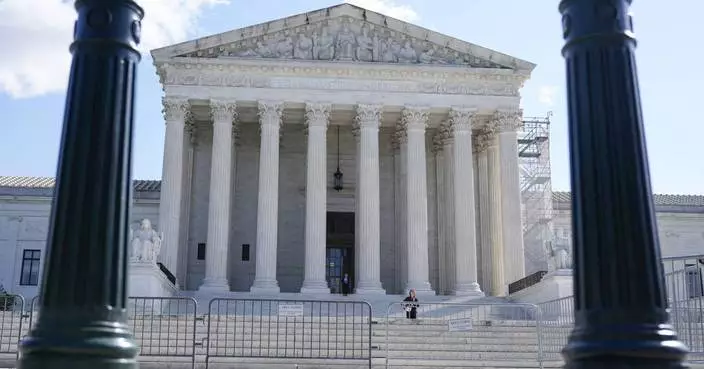WASHINGTON (AP) — A U.S. court has given two top associates of Saudi Crown Prince Mohammed bin Salman until early November to start turning over any evidence in a lawsuit from a former senior Saudi intelligence official who says he survived a plot by the kingdom to silence him.
The order is among a spate of recent rulings suggesting U.S. courts are becoming more open to lawsuits seeking to hold foreign powers accountable for rights abuses, legal experts and advocates say. That is after a couple of decades in which American judges tended to toss those cases.
The long-running lawsuit by former Saudi intelligence official Saad al-Jabri accuses Saudi Arabia of trying to assassinate him in October 2018. The kingdom calls the allegation groundless. That's the same month the U.S., U.N. and others allege that aides of Prince Mohammed and other Saudi officials killed U.S.-based journalist Jamal Khashoggi, whose columns for The Washington Post were critical of the crown prince.
Al-Jabri's lawsuit asserts that the plot against him involved at least one of the same officials, former royal court adviser Saud al-Qahtani, whom the Biden administration has sanctioned over allegations of involvement in Khashoggi's killing.
The ruling is among a half-dozen recently giving hope to rights groups and dissidents that U.S. courts may be more open again to lawsuits that accuse foreign governments and officials of abuses — even when most of the alleged wrongdoing took place abroad.
“More and more ... it seems like the U.S. courts are an opportunity to directly hold governments accountable,” said Yana Gorokhovskaia, research director at Freedom House, a U.S.-based rights group that advocates for people facing cross-border persecution by repressive governments.
“It's an uphill battle,” especially in cases where little of the alleged harassment took place on U.S. soil, Gorokhovskaia noted. “But it's more than we saw, definitely, even a few years ago.”
Khalid al-Jabri, a doctor who like his father lives in exile in the West for fear of retaliation by the Saudi government, said the recent ruling allowing his father's lawsuit to move forward will do more than help recent victims.
It “hopefully, in the long run, will make ... oppressive regimes think twice about transnational repression on U.S. soil,” the younger al-Jabri said.
The Saudi Embassy in Washington acknowledged receiving requests for comment from The Associated Press in the al-Jabri case but did not immediately respond. Lawyers for one of the two Saudis named in the case, Bader al-Asaker, declined to comment, while al-Qahtani's attorneys did not respond.
Past court motions by lawyers for the crown prince called al-Jabri a liar wanted in Saudi Arabia to face corruption allegations and said there was no evidence of a Saudi plot to kill him.
The Saudi government, meanwhile, has said the killing of Khashoggi by Saudi agents inside the Saudi consulate in Istanbul was a “rogue operation” carried out without the crown prince's knowledge.
Khashoggi's killing and the events alleged by al-Jabri took place in a crackdown in the first years after King Salman and his son Prince Mohammed came to power in Saudi Arabia, after the 2015 death of King Abdullah. They detained critics and rights advocates, former prominent figures under the old king, and fellow princes for what the government often said were corruption investigations.
Al-Jabri escaped to Canada. As with Khashoggi, the lawsuit alleges the crown prince sent a hit team known as the “Tiger Squad” to kill him there but claims the plot was foiled when Canadian officials questioned the men and examined their luggage. Canada has said little about the case, although a Royal Canadian Mounted Police investigator has testified that officials found the allegations credible and said they remain under investigation.
Saudi Arabia detained a younger son and daughter of al-Jabri in what the family alleges is an effort to pressure the father to return to the kingdom.
Until now, efforts to sue Saudi officials and the kingdom over Khashoggi's and al-Jabri's cases have foundered. U.S. courts have said that Prince Mohammed himself has sovereign immunity under international law.
And judgments in civil cases against foreign governments and officials can have little effect beyond the reputational hit. Courts sometimes find in favor of the alleged victim by default when a regime or official fails to respond.
U.S. courts noted the alleged plot against al-Jabri targeted him at his home in Canada, not in the United States, although al-Jabri alleges the crown prince's aides used a network of Saudi informants in the U.S. to learn his whereabouts.
Late this summer, a federal appeals court in Washington reversed a dismissal of al-Jabri’s claims by a lower court. He is legally entitled to gather any evidence to see if there is enough to justify trying the case in the U.S., the appeals court said.
Federal courts ordered al-Qahtani and al-Asaker last month to start turning over all relevant texts, messages on apps and other communication in the case by Nov. 4.
It's an “exciting development,” said Ingrid Brunk, a professor of international law at Vanderbilt University and an expert in international litigation.
Courts in the U.S. and other democracies have been favorite venues to bring human-rights cases against repressive governments. But rulings by the U.S. Supreme Court since 2004 had choked off such lawsuits in cases involving foreign parties, which often have little link to the U.S., Brunk said.
Lately, however, particularly strong lawsuits against foreign officials and governments have been gaining footholds in U.S. courts again, she said.
“There's been some very good lawyering here,” Brunk said of al-Jabri's long-running case.
Other lawsuits also have pushed ahead. A U.S. appeals court in San Francisco last month allowed the revival of a case by Chinese dissidents accusing the Chinese government of spying on them.
Rather than suing China, however, the dissidents targeted Cisco Systems, the Silicon Valley tech company they accused of developing the security system that allowed the spying.
A federal jury trial in Florida this summer found Chiquita Brands liable in the killings of Colombian civilians by a right-wing paramilitary group that the banana company acknowledged paying. Lawyers called it a first against a major U.S. corporation.
U.S. courts also have allowed human-rights-related lawsuits naming Turkey and India to move forward recently.
Some of the uptick in human-rights cases — those naming foreign officials and governments or targeting U.S. corporations — in U.S. courts again stems from plaintiffs "pursuing really promising, really creative” legal approaches, Brunk said.
Khalid al-Jabri said the family isn't seeking money in its lawsuit. They want justice for his father, he said, and freedom for his detained sister and brother.

FILE - Saudi Arabian Crown Prince Mohammed bin Salman Al Saud attends an event on the day of the G20 summit in New Delhi, Sept. 9, 2023. (AP Photo/Evelyn Hockstein, Pool, File)
WASHINGTON (AP) — Facing a government shutdown deadline, the Senate rushed through final passage early Saturday of a bipartisan plan that would temporarily fund federal operations and disaster aid, dropping President-elect Donald Trump's demands for a debt limit increase into the new year.
House Speaker Mike Johnson had insisted Congress would “meet our obligations” and not allow federal operations to shutter ahead of the Christmas holiday season. But the day's outcome was uncertain after Trump doubled down on his insistence that a debt ceiling increase be included in any deal — if not, he said in an early morning post, let the closures “start now.”
The House approved Johnson's new bill overwhelmingly, 366-34. The Senate worked into the night to pass it, 85-11, just after the deadline. At midnight, the White House said it had ceased shutdown preparations.
“This is a good outcome for the country, ” Johnson said after the House vote, adding he had spoken with Trump and the president-elect “was certainly happy about this outcome, as well.”
President Joe Biden, who has played a less public role in the process throughout a turbulent week, was expected to sign the measure into law Saturday.
“There will be no government shutdown," Senate Majority Leader Chuck Schumer said.
The final product was the third attempt from Johnson, the beleaguered House speaker, to achieve one of the basic requirements of the federal government — keeping it open. And it raised stark questions about whether Johnson will be able to keep his job, in the face of angry GOP colleagues, and work alongside Trump and billionaire ally Elon Musk, who called the legislative plays from afar.
Trump's last-minute demand was almost an impossible ask, and Johnson had almost no choice but to work around his pressure for a debt ceiling increase. The speaker knew there wouldn’t be enough support within the GOP majority to pass any funding package, since many Republican deficit hawks prefer to slash the federal government and certainly wouldn’t allow more debt.
Instead, the Republicans, who will have full control of the White House, House and Senate next year, with big plans for tax cuts and other priorities, are showing they must routinely rely on Democrats for the votes needed to keep up with the routine operations of governing.
“So is this a Republican bill or a Democrat bill?” scoffed Musk on social media ahead of the vote.
The drastically slimmed-down 118-page package would fund the government at current levels through March 14 and add $100 billion in disaster aid and $10 billion in agricultural assistance to farmers.
Gone is Trump’s demand to lift the debt ceiling, which GOP leaders told lawmakers would be debated as part of their tax and border packages in the new year. Republicans made a so-called handshake agreement to raise the debt limit at that time while also cutting $2.5 trillion in spending over 10 years.
It’s essentially the same deal that flopped the night before in a spectacular setback — opposed by most Democrats and some of the most conservative Republicans — minus Trump’s debt ceiling demand.
But it's far smaller than the original bipartisan accord Johnson struck with Democratic and Republican leaders — a 1,500-page bill that Trump and Musk rejected, forcing him to start over. It was stuffed with a long list of other bills — including much-derided pay raises for lawmakers — but also other measures with broad bipartisan support that now have a tougher path to becoming law.
House Democrats were cool to the latest effort after Johnson reneged on the hard-fought bipartisan compromise.
Rep. Rosa DeLauro, the top Democrat on the Appropriations Committee, said it looked like Musk, the wealthiest man in the world, was calling the shots for Trump and Republicans.
“Who is in charge?” she asked during the debate.
Still, the House Democrats put up more votes than Republicans for the bill's passage. Almost three dozen conservative House Republicans voted against it.
“The House Democrats have successfully stopped extreme MAGA Republicans from shutting down the government, crashing the economy and hurting working-class Americans all across the nation,” House Democratic Leader Hakeem Jeffries said, referring to Trump's “Make America Great Again” slogan.
In the Senate, almost all the opposition came from the Republicans — except independent Sen. Bernie Sanders, who said Musk's interference was “not democracy, that's oligarchy.”
Trump, who has not yet been sworn into office, is showing the power but also the limits of his sway with Congress, as he intervenes and orchestrates affairs from Mar-a-Lago alongside Musk, who is heading up the new Department of Government Efficiency.
The incoming Trump administration vows to slash the federal budget and fire thousands of employees and is counting on Republicans for a big tax package. And Trump's not fearful of shutdowns the way lawmakers are, having sparked the longest government shutdown in history in his first term at the White House.
“If there is going to be a shutdown of government, let it begin now,” Trump posted early in the morning on social media.
More important for the president-elect was his demand for pushing the thorny debt ceiling debate off the table before he returns to the White House. The federal debt limit expires Jan. 1, and Trump doesn't want the first months of his new administration saddled with tough negotiations in Congress to lift the nation's borrowing capacity. Now Johnson will be on the hook to deliver.
“Congress must get rid of, or extend out to, perhaps, 2029, the ridiculous Debt Ceiling,” Trump posted — increasing his demand for a new five-year debt limit increase. "Without this, we should never make a deal."
Government workers had already been told to prepare for a federal shutdown that would send millions of employees — and members of the military — into the holiday season without paychecks.
Biden has been in discussions with Jeffries and Schumer, but White House press secretary Karine Jean-Pierre said: “Republicans blew up this deal. They did, and they need to fix this.”
As the day dragged on, Senate Republican Leader Mitch McConnell stepped in to remind colleagues “how harmful it is to shut the government down, and how foolish it is to bet your own side won’t take the blame for it.”
At one point, Johnson asked House Republicans at a lunchtime meeting for a show of hands as they tried to choose the path forward.
It wasn’t just the shutdown, but the speaker’s job on the line. The speaker’s election is the first vote of the new Congress, which convenes Jan. 3, and some Trump allies have floated Musk for speaker.
Johnson said he spoke to Musk ahead of the vote Friday and they talked about the “extraordinary challenges of this job.”
Associated Press writers Kevin Freking, Stephen Groves, Mary Clare Jalonick, Darlene Superville and Bill Barrow contributed to this report.
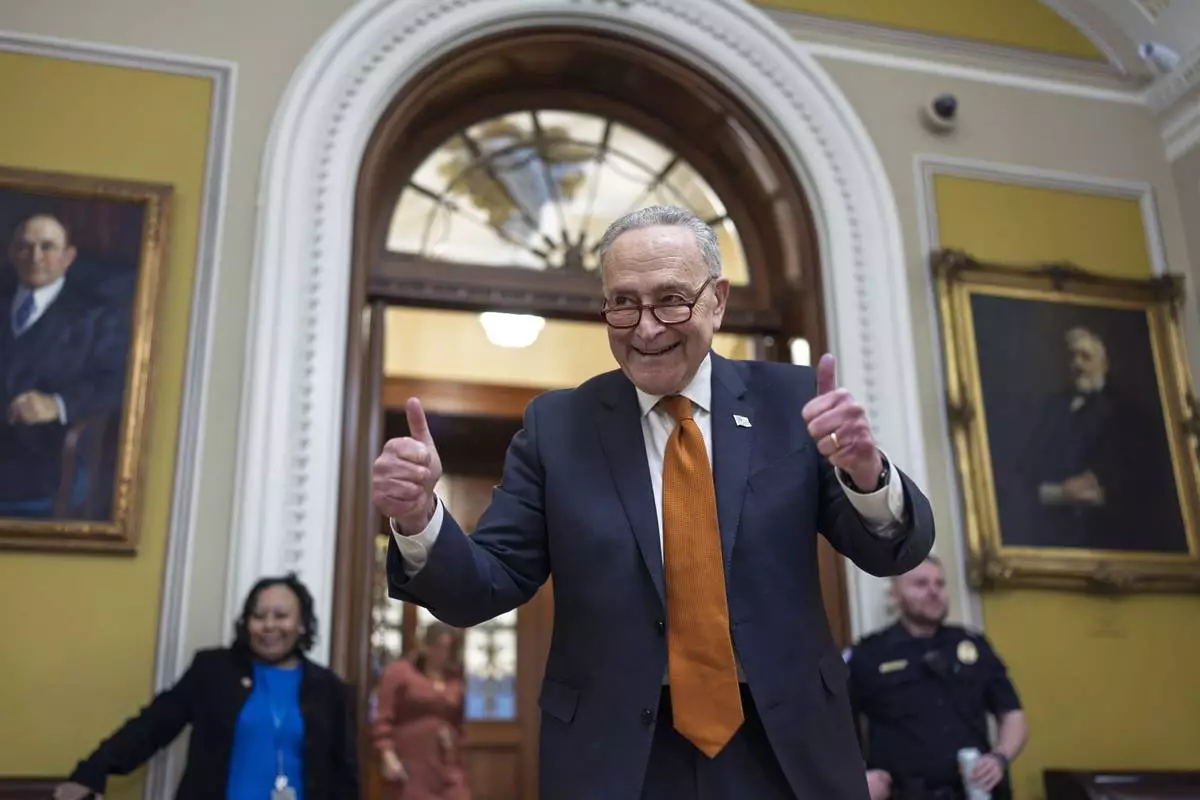
Senate Majority Leader Chuck Schumer, D-N.Y., celebrates as the Senate begins voting on the government funding bill just in time to meet the midnight deadline, at the Capitol in Washington, Friday, Dec. 20, 2024. (AP Photo/J. Scott Applewhite)
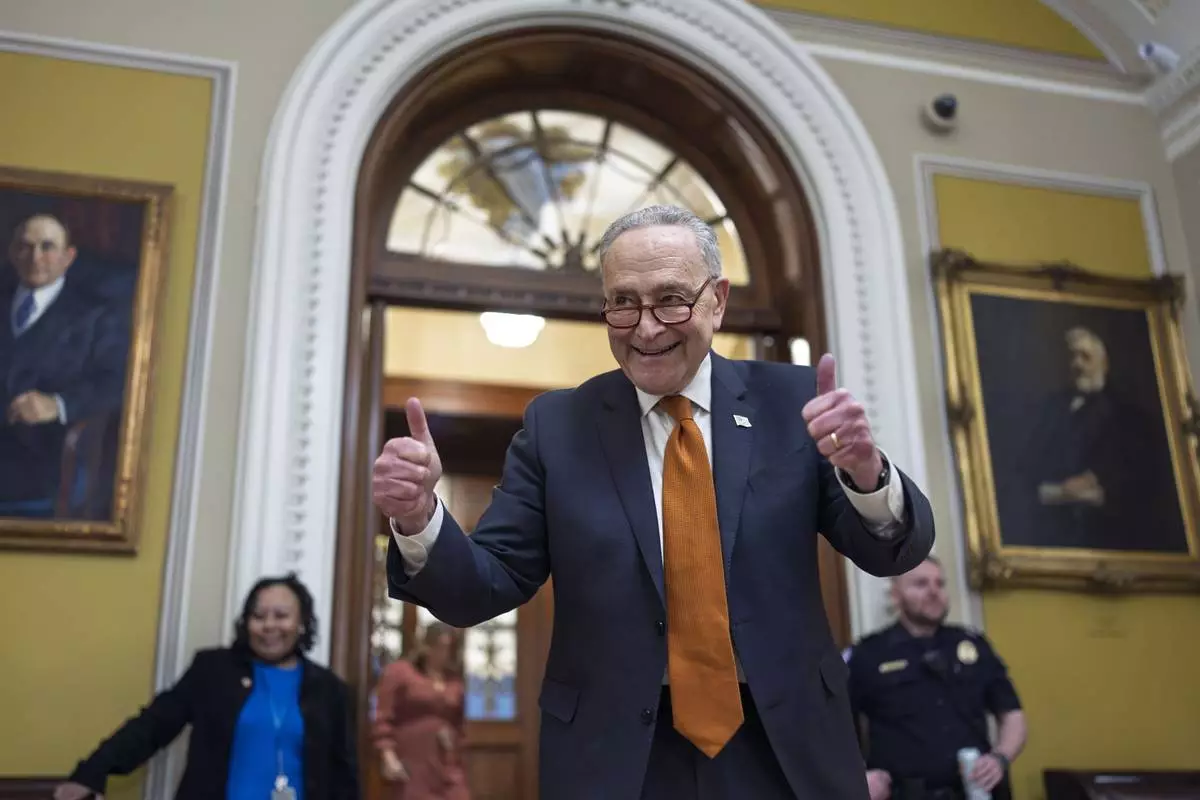
Senate Majority Leader Chuck Schumer, D-N.Y., celebrates as the Senate begins voting on the government funding bill just in time to meet the midnight deadline, at the Capitol in Washington, Friday, Dec. 20, 2024. (AP Photo/J. Scott Applewhite)

Speaker of the House Mike Johnson, R-La., talks to reporters after passing the funding bill to avert the government shutdown at the Capitol in Washington, Friday, Dec. 20, 2024. (AP Photo/Jose Luis Magana)

Speaker of the House Mike Johnson, R-La., talks to reporters after passing the funding bill to avert the government shutdown at the Capitol in Washington, Friday, Dec. 20, 2024. (AP Photo/Jose Luis Magana)
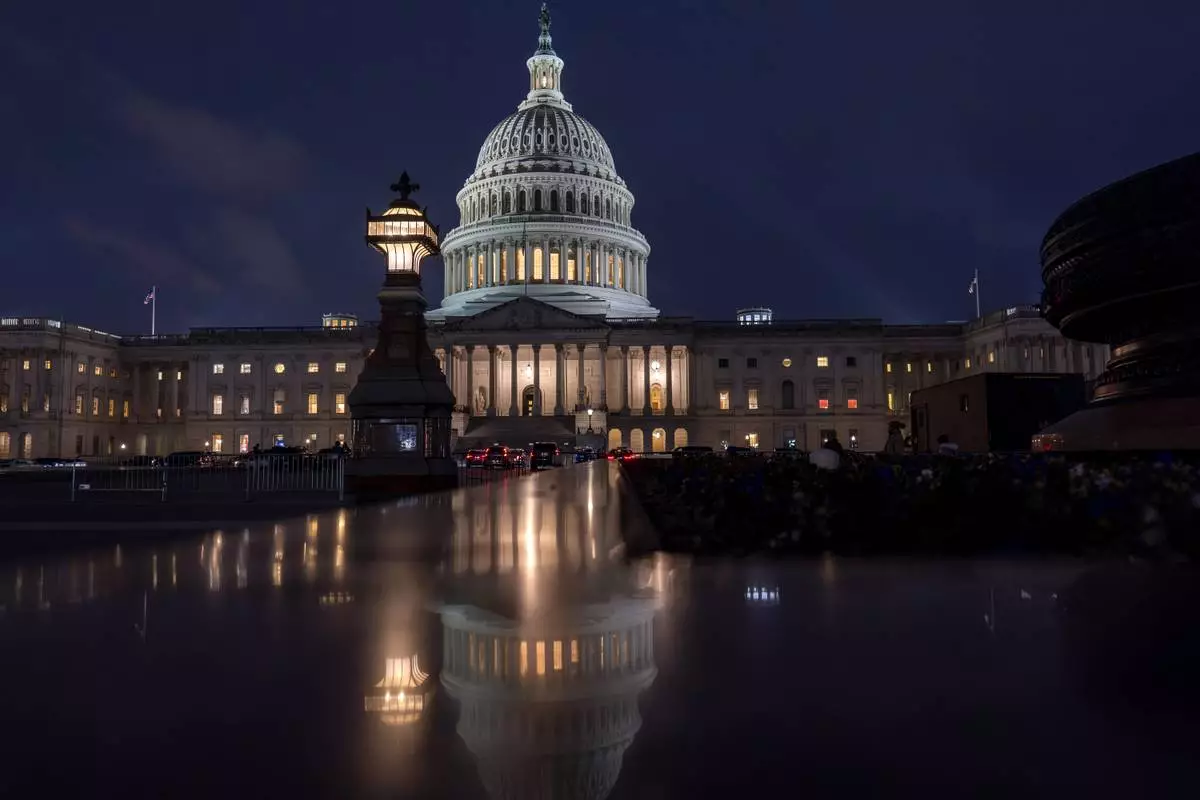
The Capitol is pictured in Washington, Friday, Dec. 20, 2024. (AP Photo/J. Scott Applewhite)

Speaker of the House Mike Johnson, R-La., emerges from a closed-door meeting with fellow Republicans at the Capitol in Washington, Friday, Dec. 20, 2024. (AP Photo/J. Scott Applewhite)
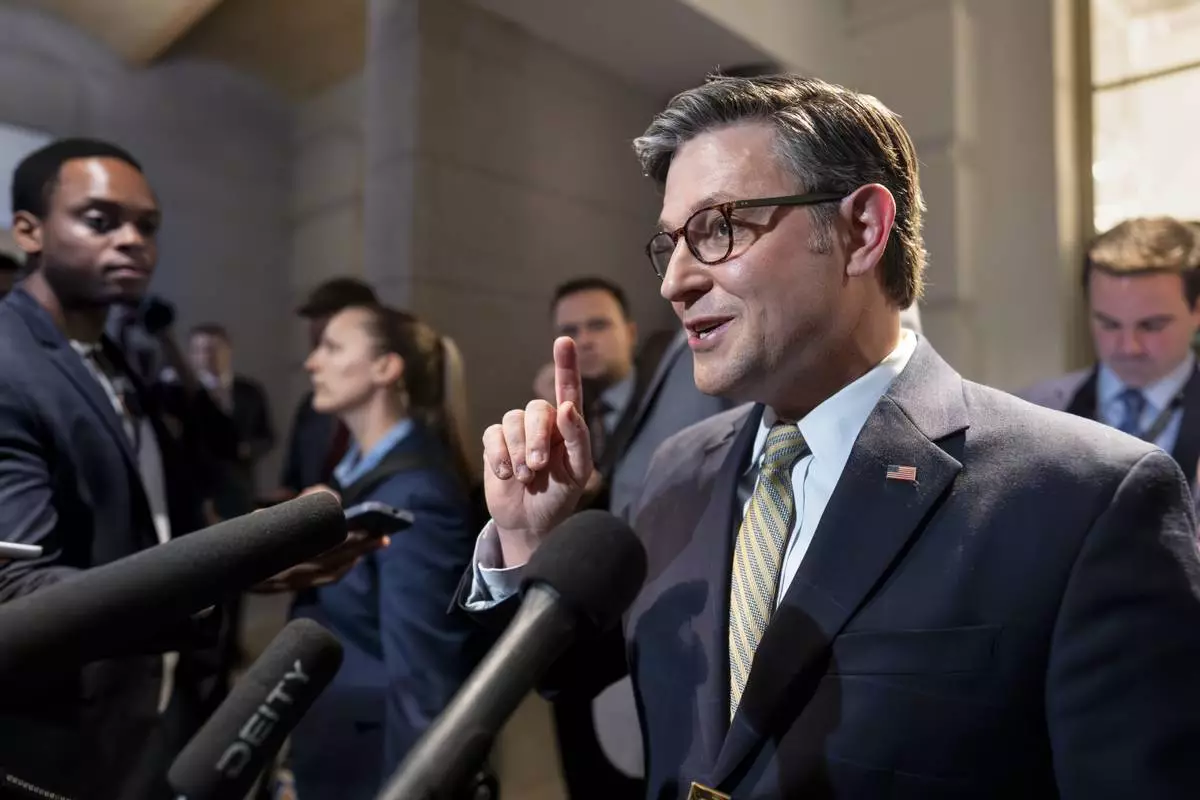
Speaker of the House Mike Johnson, R-La., emerges from a closed-door meeting with fellow Republicans at the Capitol in Washington, Friday, Dec. 20, 2024. (AP Photo/J. Scott Applewhite)
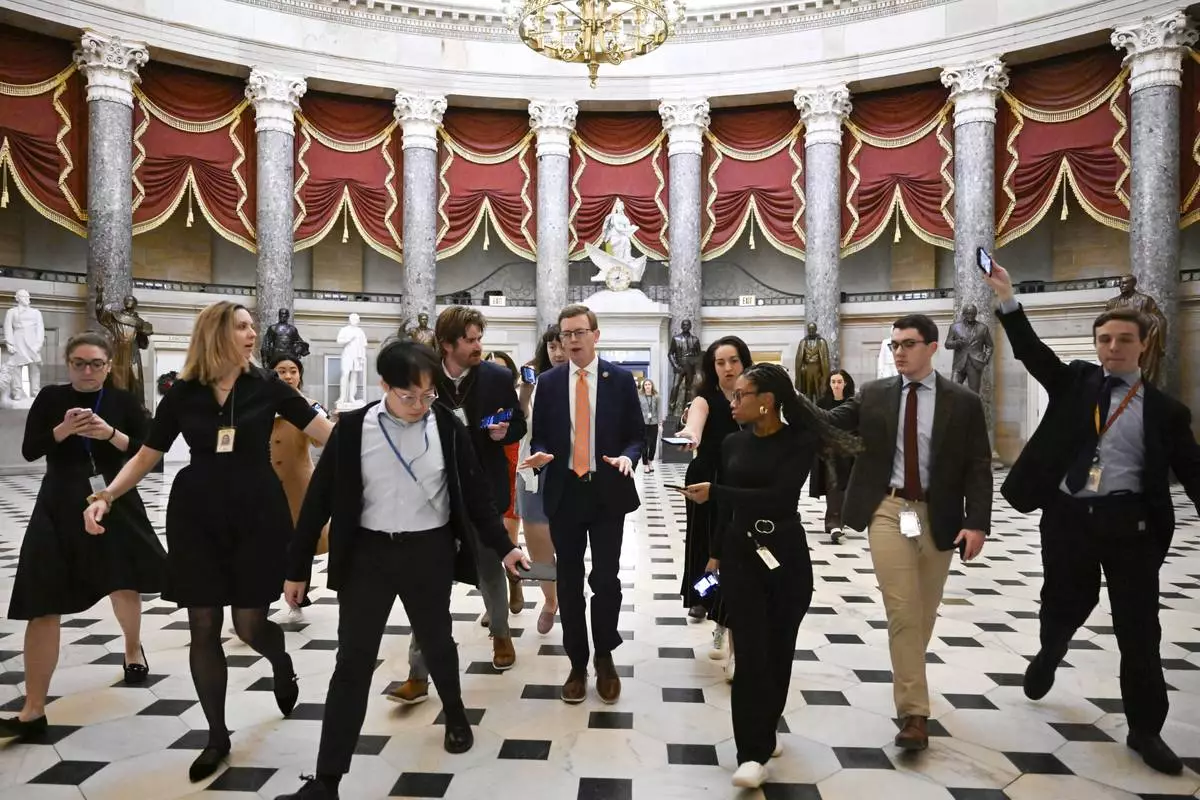
Rep. Dusty Johnson, R-S.D., talks with reporters after attending a meeting with Speaker of the House Mike Johnson, R-La., as the House works on a spending bill to avert a shutdown of the Federal Government, Friday, Dec. 20, 2024, at the Capitol in Washington. (AP Photo/John McDonnell)

FILE - President-elect Donald Trump poses for a photo with Dana White, Kid Rock and Elon Musk at UFC 309 at Madison Square Garden, Nov. 16, 2024, in New York. (AP Photo/Evan Vucci, File)
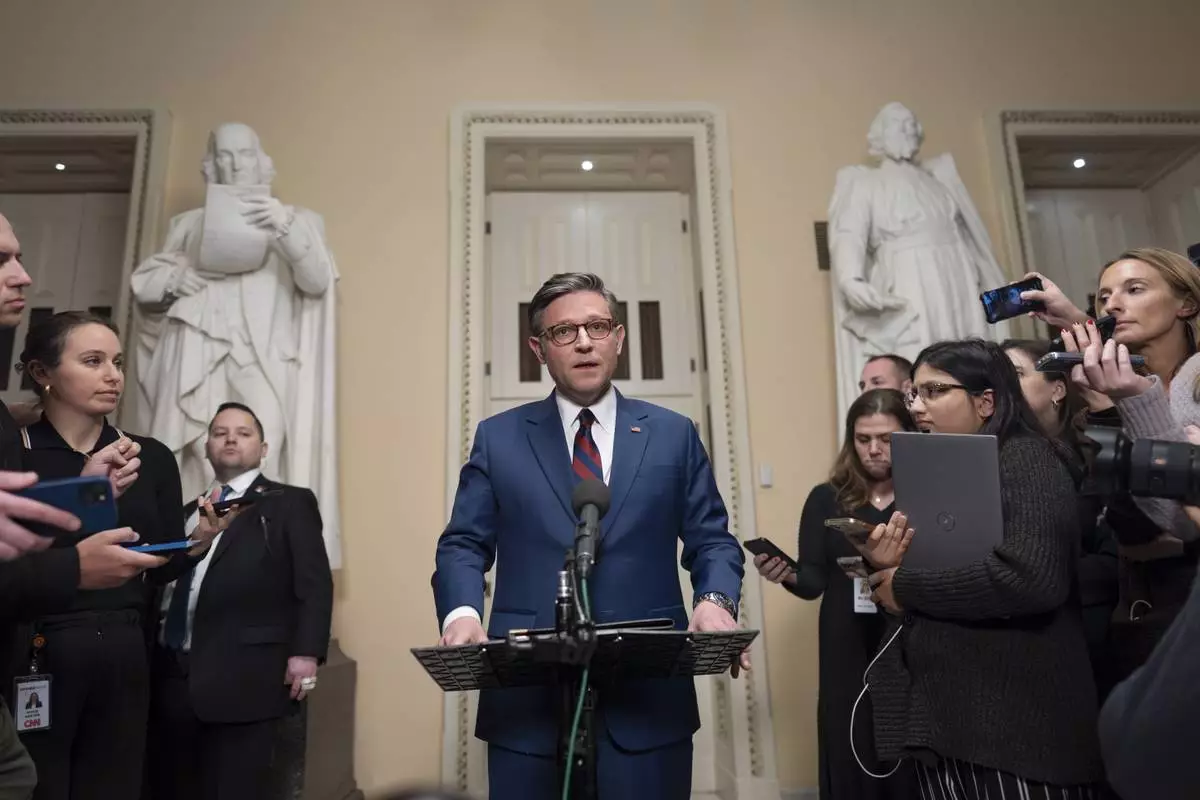
Speaker of the House Mike Johnson, R-La., talks briefly to reporters just before a vote on an interim spending bill to prevent a government shutdown, at the Capitol in Washington, Thursday, Dec. 19, 2024. The vote failed to pass. (AP Photo/J. Scott Applewhite)
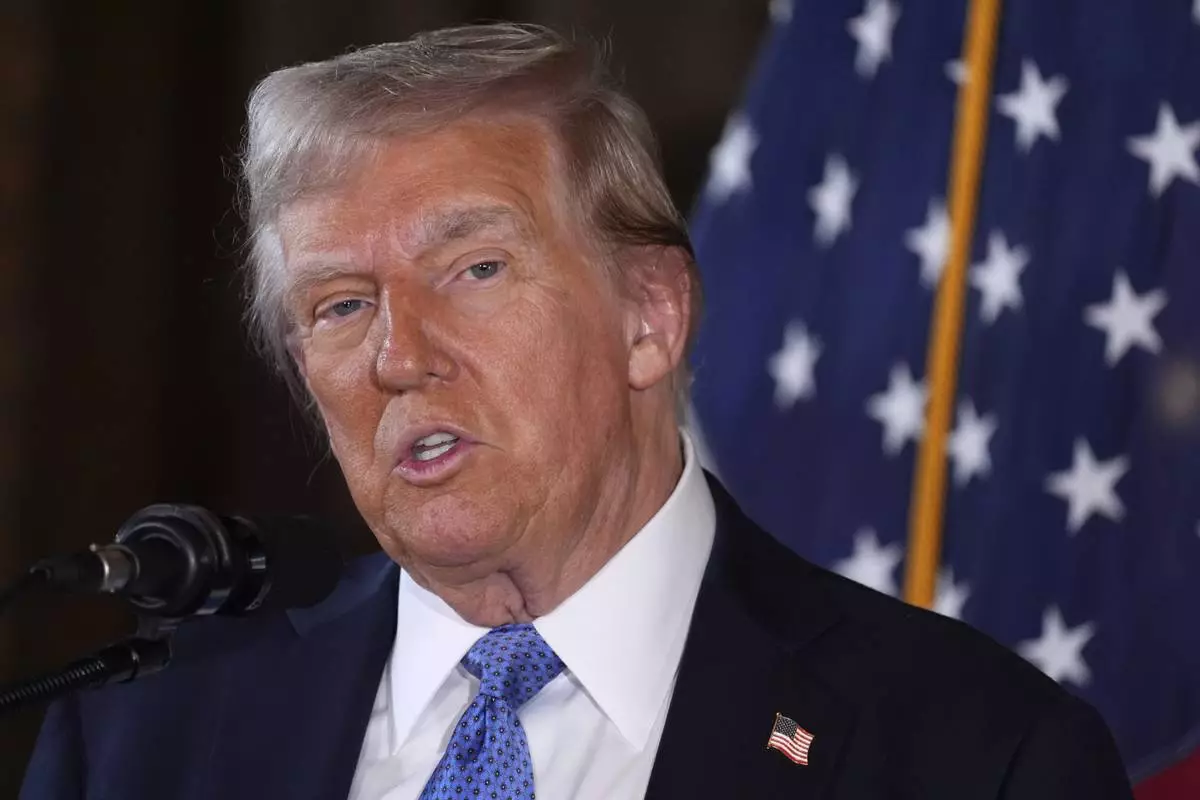
President-elect Donald Trump speaks during a news conference at Mar-a-Lago, Monday, Dec. 16, 2024, in Palm Beach, Fla. (AP Photo/Evan Vucci)




















